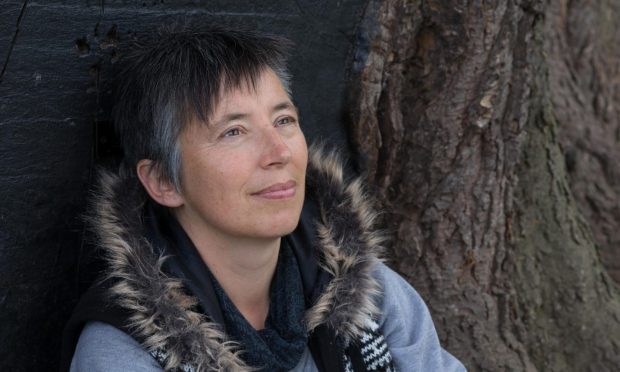
Best-selling, award-winning novelist Manda Scott cites the late American sci-fi author Ursula K Le Guin in her new novel.
“Any human power can be resisted and changed by human beings. Resistance and change often begin in art. Very often in our art, the art of words,” she recounts.
Manda is setting out her stall. The Glasgow-born Orange Prize short-lister’s compelling, genre-bending new fiction is pitched as a “route map” for change that could lead to “a world we would be proud to leave to future generations”.
Borne out of the meta crisis – the human-engendered sixth mass extinction, climate change, global war and polarisation of power and wealth – Any Human Power tells the story of grandmother Lan and her family.
A decade after Lan makes a deathbed promise that binds her to “the Beyond”, her granddaughter makes a protest “tweet” that sparks an international storm of outrage and pitches the teenager and her family against the deadly wrath of the old establishment, fearful of an empowered youth.
Inspired by a real-life tweet, it is neither depressing dystopia nor too-distant utopia, but is pitched as a “thru-topia” – a plausible path to a better future and one that weaves existing technology and ground-breaking social, economic and political models with ancient, long-lost wisdoms.
Manda – winner of the coveted McIlvanney Prize and author of the historical thriller series Boudica – tells P.S: “We are a storied species, everything we do relies on the stories we tell ourselves and each other about ourselves and our relationship to the world. So, we need to tell ourselves the stories that show a different way of being.”
The former equine veterinarian-turned-Shamanic practitioner explains: “In the book a movement arises because social media is used for good. I had this sense that the crux (of the novel) needed not to be obviously about the climate apocalypse and this tweet came up from a 12-year-old girl and was quickly taken down. I wanted to honour the person who posted it and look at what might have happened if there was support for her.”
Social media models that intelligently bridge conceptual divides already exist, she says, pointing to Audrey Tang, Taiwan’s 43-year-old minister of digital affairs whose country’s civil society groups and government work together to harness technology for good, giving its people more say in how their country is run, and how its problems are tackled.
The author, who hosts the Accidental Gods podcast featuring those at the leading edge of global change, says she wants to see “total systemic change.” She argues: “We need democratic and economic change. We need to stop an economic system that is destructive – ‘see, want, consume, destroy’ is not a good model. It creates a sense of separation, scarcity, and powerlessness, and we need to flip that to a model of agency, sufficiency and connection.”
The novel explores the introduction of random drink and drugs testing in parliaments, total transparency in government spending, and in the finances of companies seeking government contracts, and the creation of “custodians” in big business, each representing shareholders, workers, customers, supply chain, local people, the environment and future generations. The book also sees the voting age for UK general elections lowered to 16. Manda smiles: “I want seven generations down the line to look at us living today and say ‘yes, they left it quite late and made mistakes along the way, but when it really mattered, they made the necessary changes so that we can feel safe, connected and have agency; so that world is a good place.”
Manda Scott, Any Human Power, September Publishing, £18.99. Manda will be at the 21st Nairn Book and Arts Festival that kicks off on August 31.

Enjoy the convenience of having The Sunday Post delivered as a digital ePaper straight to your smartphone, tablet or computer.
Subscribe for only £5.49 a month and enjoy all the benefits of the printed paper as a digital replica.
Subscribe